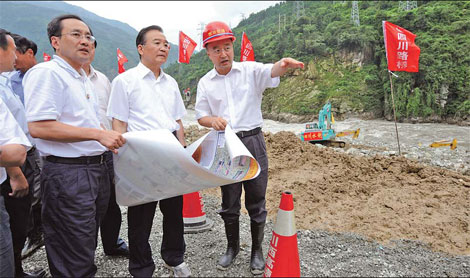China
Quake, and now mudslides
By Huang Zhiling (China Daily)
Updated: 2010-08-24 11:00
 |
Large Medium Small |
|
 Premier Wen Jiabao (second from right) directs road repair work teams during a visit to Yingxiu on Monday. Ouyang Jie / For China Daily |
Some areas have been hit twice by natural disasters
YINGXIU, Sichuan - Carrying his toddler son, Zhang Kaimin gazed sadly at his courtyard buried deep in the mud in Fengxiangshu village of Yingxiu town, Wenchuan county in Sichuan province.
After the magnitude 8.0 Wenchuan earthquake on May 12, 2008, damaged his house, Zhang borrowed 500,000 yuan ($73,500) to reinforce and decorate the house. Last August, his farm courtyard, which could accommodate 50 tourists to drink tea, play mah-jong and have meals, opened.
Business was thriving and he had expected to repay the debt by next summer. But mudslides that started slashing Sichuan on Aug 14 resulted in a nightmare for his family of three.
"We have lost everything and will have to restart," he said.
Not only Zhang's house but also much of Yingxiu, the epicenter of the Wenchuan quake, will have to be rebuilt as a result of the mudslides, government sources said.
Planning the reconstruction of the small town that was battered in the devastating 2008 quake that left 87,000 people dead or missing, geologists made a careful examination of Yingxiu. Thanks to their proposal, steel nets were fastened to the mountainsides surrounding the town to prevent mudslides.
But they neglected the hazards of the Minjiang River when planning the town's reconstruction along the river, said Xu Qiang, a geologist from the Chengdu University of Technology.
Minjiang is a tributary of the Yangtze River in its upper reaches.
While planning post-quake reconstruction, Sichuan invited geologists to appraise all the sites to be rebuilt. Some of the sites that experts had considered to be safe were submerged in mudslides, said Jiang Jun, deputy director of the environment division of the Sichuan provincial department of land and resources.
On Aug 14, mudslides from Hongchungou valley in Zhang's village blocked the Minjiang and floods caused the river to change course, inundating the new Yingxiu town, which was being rebuilt.
Mudslides dealt a heavy blow to the small town rising from the quake ruins. Its losses from damaged residences, agriculture, infrastructure and post-quake reconstruction projects stand at around 630 million yuan, said Luo Erji, deputy county chief of Wenchuan.
Some post-quake reconstruction projects, which were set to have been completed before Aug 26, will now have to be rebuilt, he said.
The Yingxiu Water Plant, which was built with about 19 million yuan from Dongguan city of South China's Guangdong province, would have started operation soon if it were not for the mudslides.
All the equipment had been installed in the plant. But the plant was ruined by the mudslides, Luo said.
Many residences built in the town with aid from Dongguan were submerged for five days. No one knows yet whether they will ever be safe for habitation in the future, he said.
In rebuilding the town, workers had inserted sewer and communications pipelines underground. But many sewers were blocked with rocks brought in by the mudslides. The town had to reopen the asphalt roads to lay the pipes.
The price could be triple compared with previous efforts, the deputy county chief said.
To prevent mudslides caused by floods, Yingxiu will build a big dam along the river in its future reconstruction, he said.
Longchi, a mountainous town in neighboring Dujiangyan city, has to be rebuilt after the mudslides, too.
After the quake, the town built many country inns and farm courtyards catering to tourists, like the one built by Zhang in Yingxiu.
But two years of efforts have been wasted in the wake of the mudslides.
"Almost all the inns and courtyards have been destroyed. Farmers who were about to count money now are shedding tears," said Wang Jin, the town's Party chief.
Flooding and mudslides caused by heavy rain in Sichuan province have left at least 16 people dead and 66 missing, according to local provincial authorities.
Yan Weidong, chief of the provincial emergency response office, said flooding and mudslides have affected nearly 5.8 million people in 67 cities and counties in Sichuan.
Yan said more than 10,700 houses have been destroyed and more than 100 highways were damaged or cut. In addition, some 5,067 hectares of arable land have been ruined.
China Daily